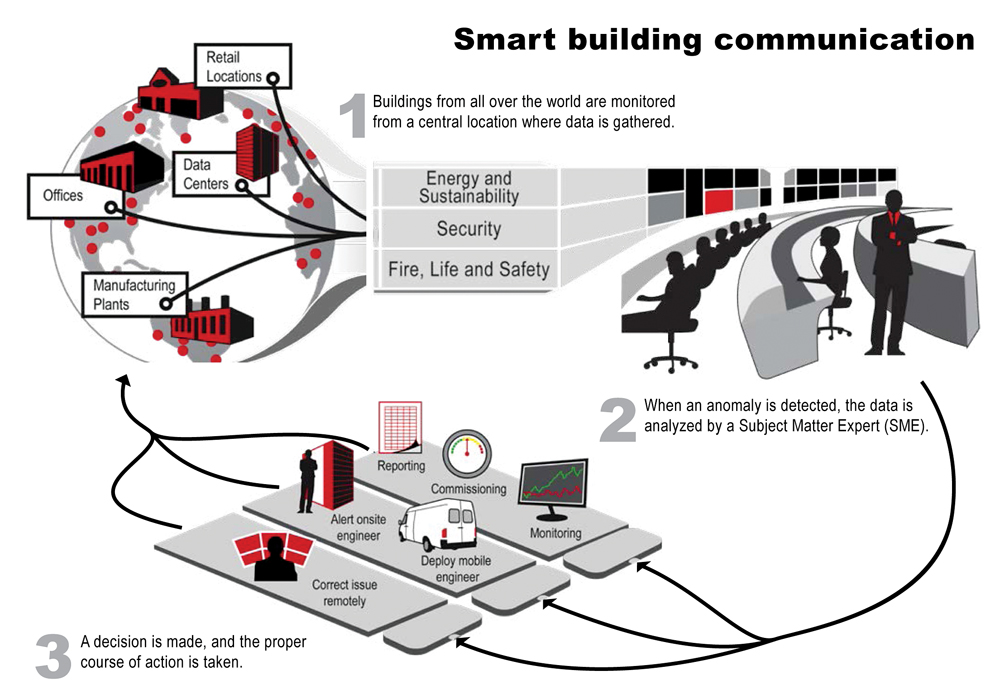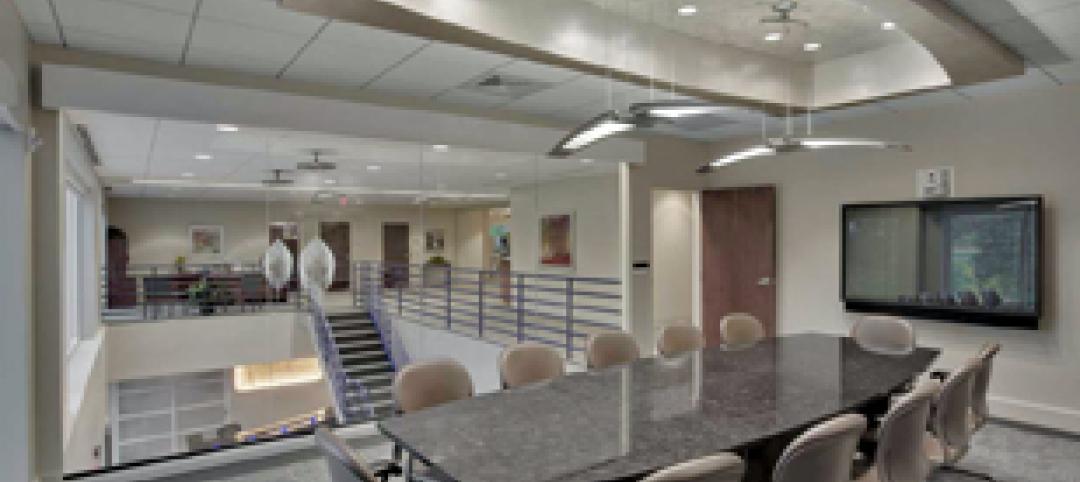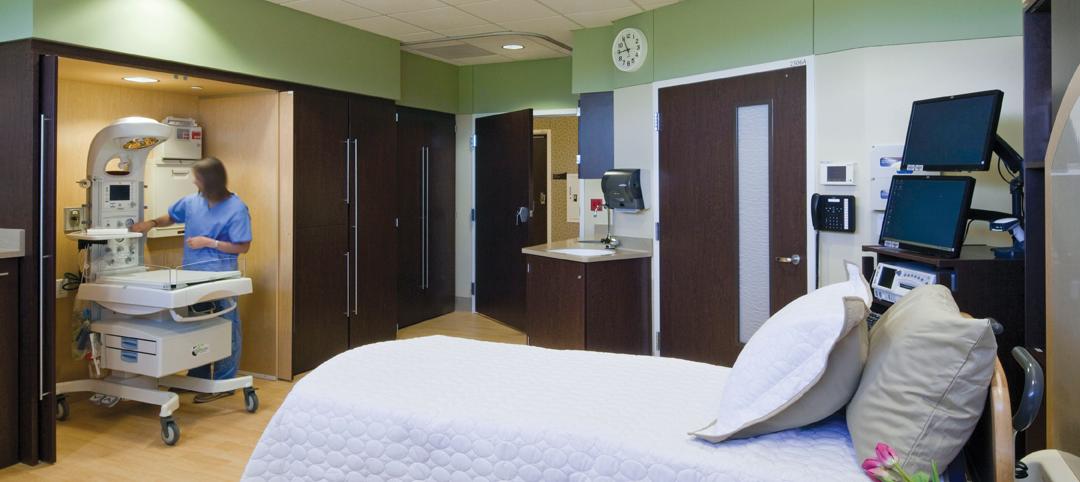Building automation systems and so-called “smart” controllers are nothing new. Building owners have been implementing remote monitoring and control systems for HVAC and lighting for decades. But with the cost of IT components like wireless sensors dropping and technologies like smart meters and cloud-based building management solutions coming on the market, a new era of connectivity and data generation is upon us.
The question becomes: How can commercial building owners leverage real-time, building-related data to more efficiently operate and maintain buildings? Can data analytics, for example, warn facilities teams about problems with equipment before they reach the point of failure? Can it detect subtle changes in fan speed, air temperatures, and energy consumption to trigger continuous adjustments to optimize equipment performance?
Real estate services giant Jones Lang LaSalle set out to answer these questions when it partnered with Pacific Controls to develop IntelliCommand, a 24/7 real-time remote monitoring and control service for its commercial real estate owner clients.
The service—which was pilot tested last year by Procter & Gamble on 12 of its buildings around the world, totaling 3.2 million sf—utilizes Pacific Controls’ wireless sensors to collect and send building performance data from various building automation systems to a remote command center operated by JLL. There, facilities operations experts who are well versed in data analytics and information technology are able to spot and diagnose anomalies that indicate a building system is not running efficiently.
The command center tracks data around the clock, allowing facilities experts to make constant adjustments to fine-tune building performance and address equipment problems before they become serious.
“We can do everything from test equipment to fix building controls remotely,” says Leo O’Loughlin, JLL’s Senior Vice President of Energy and Sustainability, who presented on the topic at BD+C’s BUILDINGChicago/Greening the Heartland conference in September. “For example, our command center has the ability to remotely test 500 VAV boxes in multiple buildings in multiple locations at 2 a.m. and then submit a work order for the 15 or 20 that need fixing.”
O’Loughlin calls JLL’s new service the future of commissioning—continuous, monitor-based commissioning versus the traditional approach of assess/diagnose/fix/let deteriorate. “It’s all about getting ahead of the maintenance curve,” he says.
The results from the P&G pilot test were impressive: energy costs were slashed by 10% across the 12 buildings in just 11 months, and the investment paid for itself in three months—all without implementing any major building system upgrades.
Managers were able to identify problems that manual inspections could not detect, according to O’Loughlin, including inaccurate thermostat default settings, a temperature anomaly indicating that a heater was operating when not needed, and room-to-room temperature differences that indicated malfunctioning dampers, triggering unnecessary air conditioning. The service saved 8% in energy costs at one pilot location simply by reducing HVAC activity on nights, weekends, and holidays.
“It makes smart buildings smarter,” says Larry Bridge, Global Facilities and Real Estate Governance Manager at P&G. Bridge is currently working with JLL to deploy IntelliCommand throughout its global real estate portfolio of 76 buildings. “Smart building technology is not just about energy cost savings,” he says. “We also get reliability improvements and more efficient work order production.”
Related Stories
| Mar 1, 2012
8 tips for architects to consider before LED installation
Lighting experts offer Building Team members critical information to consider before upgrading lighting systems to LEDs.
| Mar 1, 2012
Reconstruction Awards: Reinvesting in a neighborhood’s future
The reconstruction of a near-century-old derelict public works facility in Minneapolis earns LEED Platinum—and the hearts and minds of the neighboring community.
| Mar 1, 2012
7 keys to ‘Highest value, lowest cost’ for healthcare construction
The healthcare design and construction picture has been muddied by uncertainty over the new healthcare law. Hospital systems are in a bind, not knowing what levels of reimbursement to expect. Building Teams serving this sector will have to work even harder to meet growing client demands.
| Mar 1, 2012
Cornell shortlists six architectural firms for first building on tech campus
Each of the firms will be asked to assemble a team of consultants and prepare for an interview to discuss their team’s capabilities to successfully design the university’s project.
| Mar 1, 2012
Aragon Construction completes 67,000-sf build-out in NYC
Aragon constructed the space in partnership with Milo Kleinberg Design Associates, (MKDA) and the Craven Corp. as the owner’s representative.
| Mar 1, 2012
Bomel completes design-build parking complex at U.C. San Diego
The $24-million facility, which fits into a canyon setting on the university’s East Campus, includes 1,200 stalls in two adjoining garages and a soccer field on a top level.
| Mar 1, 2012
Eidco Construction bolsters Chicago office
Eldco hires Peterson and Vivoda as senior project managers.
| Mar 1, 2012
Reconstruction of L.A.’s Dunbar Hotel underway
Withee Malcolm Architects’ designs for the project include the complete renovation of the Dunbar Hotel and the Somerville Apartments I and II.
| Feb 29, 2012
C.W. Driver opens new office, appoints Castillo regional SVP
Castillo will oversee projects with new and existing clients in northern California within the areas of education, healthcare/biomedical, public sector, military contracting, entertainment, retail, corporate and hospitality.
| Feb 29, 2012
Report says BIPV glass market to reach $6.4 billion by 2016
The report analyzes the opportunities for BIPV glass products using c-Si, thin-film and OPV/DSC materials and provides eight-year forecasts in terms of MW and square footage shipped as well as forecasts of revenue generated.


















